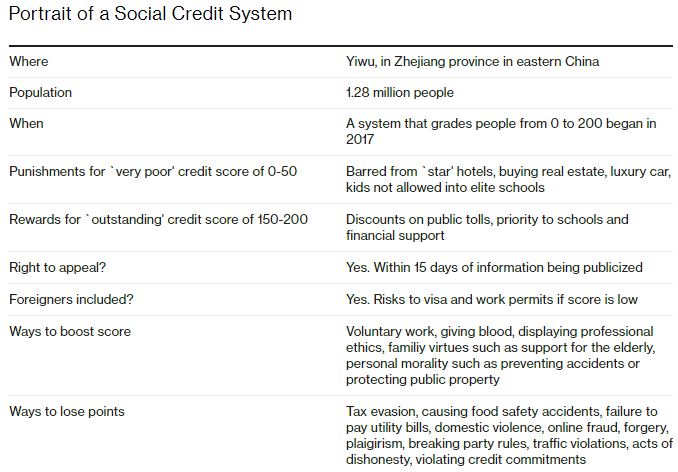How China Is Planning to Rank 1.3 Billion People
| |
|||
| แหล่งที่มา : www.bloomberg.com/businessweek | วันที่โพสต์ : 3 ธ.ค. 2561 | ||
| How China Is Planning to Rank 1.3 Billion People | |||
 |
|||
 |
|||
|
China has a radical plan to influence the behavior of its 1.3 billion citizens: It wants to grade them based on aspects of their lives to reflect how good (or bad) a civilian they are. Versions of the so-called social credit system are being tested in a dozen or so cities with the aim of creating a network that encompasses the whole nation. Critics say it’s a heavy-handed, intrusive and sinister way for a one-party state to control the population. Supporters say it’ll make for a more considerate, civilized and law-abiding society. The government has warned: “Those who violate the law and lose the trust will pay a heavy price.” 1. Is this for real?Yes. In 2014, China’s cabinet released sweeping plans to establish a countrywide social credit system by 2020. Local trials covering about 6 percent of the population are already rewarding good behavior and punishing bad actions, with capital city Beijing due to begin its program by the end of 2020. Since 2015, a national network that collates central and local government information has been used to blacklistmillions of people from booking flights and high-speed train trips -- part of a system that could one day be linked to the social credit program. There are, however, doubts about whether China will be able to establish a universal system or have to make do instead with a hodgepodge of smaller networks. President Xi Jinping has called for a social credit system that covers the whole society. 2. Why does China say it’s doing this?“Keeping trust is glorious and breaking trust is disgraceful.” That’s the guiding ideology of the plan as outlined in a 2014 document. China has suffered from rampant corruption, financial scams and corporate scandals such as tainted baby milk in its breakneck industrialization of the past several decades. The social credit system is billed as an attempt to raise standards and restore trust as well as a means to uphold basic laws that are often flouted. 3. How are people judged?That varies place to place. In the eastern city of Hangzhou, “pro-social” activity includes donating blood and voluntary work, while violating traffic laws lowers an individual’s credit score. In Zhoushan, an island near Shanghai, no-nos include mobile phone usage or smoking while driving, vandalism, walking dogs without leashes and playing music loudly in public. Credit scores can be boosted in nearby Yiwu by supporting the elderly or protecting public property while points can be lost for failing to pay utility bills, breaking Communist Party rules or committing fraud. Spending too long on video games and circulating fake news also can count against individuals, various media reported. According to Foreign Policy, residents in the northeastern city of Rongcheng adapted the official system to add their own penalties for illegally spreading religion and defaming others online. 4. What happens if someone’s social credit falls?People may be denied basic services or barred from borrowing money. In Yiwu, a citizen with a low social credit score cannot stay in fancier hotels, buy real estate, purchase a luxury car or send their children to certain private schools. “Trust-breakers” face restrictions on employment including in finance, according to a 2016 government directive. 5. Is it possible to appeal?Yiwu citizens have 15 days to appeal credit information that’s released by the authorities, according to city guidelines. A case elsewhere highlighted by Human Rights Watch showed that citizens aren’t always aware that they’ve been blacklisted, and that it’s far from straightforward to rectify mistakes. 6. Do the rules apply to foreigners?For the pilot scheme in Yiwu, foreigners are included. A bad credit score will result in visas and residence permits not being issued or renewed and the “cancellation of foreign exchange settlement business.” Foreigners with a good score will enjoy benefits such as preferential loans and multiple-entry visas. Source: Yiwu government website
7. What part is technology playing?Big-data advances have simplified the task of collating vast databases. The so-called “National Credit Information Sharing Platform,” which is used to blacklist air and rail passengers, brings together information from central government ministries and local government. Regional officials are studying how to apply facial-recognition technology to identify jaywalkers and cyclists who run red lights, according to local media. China has already deployed similar technology in Xinjiang, site of a much-criticized crackdown on its Uighur population. The social credit system is “perhaps the most prominent manifestation” of the government’s intention to reinforce legal, regulatory and policy processes through the application of information technology, wrote Leiden University’s Rogier Creemers, an expert on Chinese digital policy. Human rights groups see it as a sinister move in a country where censorship 8. What’s the reaction to the credit system? of the media, internet and arts have been ramped up, with thousands of political and religious dissidents jailed in recent years. President Xi’s government will be able to significantly expand its knowledge about what people -- and even foreign businesses in China -- do and think, wrote Mirjam Messner, head of the economy and technology program at Mercator Institute for China Studies, on ChinaFile. Leiden University’s Creemers says the system “remains a relatively crude tool,” but that this may change in the future. 9. What about in China?There’s been push-back against some local systems, Creemers told the Sinica podcast. A trial in Suining, near Shanghai, was halted after criticism from official media, he said. There was also something of a backlash when unsuspecting Ant Financial customers were roped into a credit and social score system known as Sesame Credit, a subsidiary of Alibaba Group Holding Ltd. Still, educated, urban Chinese take a more positive view, according to a poll by Germany’s Mercator Institute for China Studies. Many support the system, seeing it as a means to promote honesty in society and the economy rather than a privacy violation, the study found. |
|||
The Reference Shelf
— With assistance by David Ramli |
|||







